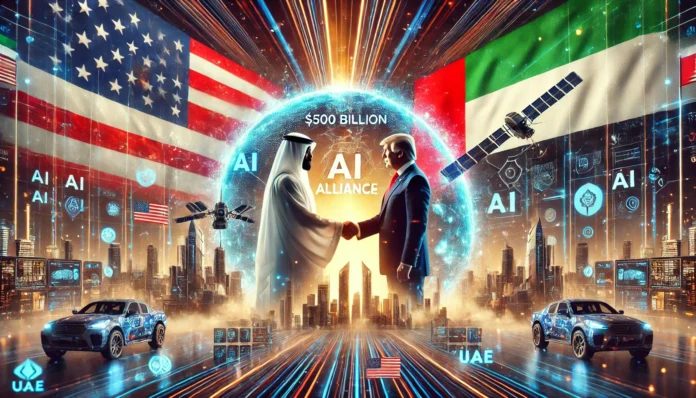The Desert Meets Silicon Valley: A New AI Superpower Emerges
In a landmark move reshaping the global AI race, the United States and the United Arab Emirates (UAE) have cemented a historic $500 billion partnership to develop next-generation artificial intelligence infrastructure, positioning themselves as a united front against China’s technological ascendancy. The collaboration, anchored by major tech firms like Nvidia, Microsoft, OpenAI, and Abu Dhabi’s sovereign wealth funds, signals a seismic shift in AI geopolitics—one where energy-rich Gulf nations and American semiconductor prowess converge to dominate the future of AI.
Why This Alliance Matters
The deal, announced during President Donald Trump’s visit to Abu Dhabi this month, centers on the Stargate UAE AI Campus, a sprawling AI supercomputing hub set to launch in 2026. Backed by OpenAI and Abu Dhabi’s MGX, the project will leverage Nvidia’s cutting-edge chips and Microsoft’s cloud infrastructure to create the world’s most advanced AI training and inference cluster. The first phase, a 200-megawatt AI data center, is slated for 2025.
Key drivers behind the alliance:
- Compute vs. Crude: The UAE offers cheap, abundant energy to power AI data centers, while the U.S. supplies the world’s most advanced semiconductors—a perfect synergy for AI scalability.
- Sovereign AI Ambitions: The UAE seeks to reduce reliance on oil by becoming a global AI leader, with its own large language model, Falcon AI, and a strategy to service emerging markets in languages like Hindi and Swahili.
- Countering China: The Trump administration’s rollback of Biden-era chip export restrictions allows U.S. tech to flow freely to the UAE, tightening the West’s grip on AI supremacy while isolating China.
The $2 Trillion Gulf AI Gold Rush
The UAE deal is part of a broader $2 trillion investment wave across the Gulf, with Saudi Arabia and Qatar also funneling capital into AI infrastructure. Notably, Emirati AI firm G42 divested its $100 million stake in ByteDance (TikTok’s parent) to avoid U.S. sanctions—a clear alignment with American interests.
Meanwhile, OpenAI’s Chief Global Affairs Officer, Chris Lehane, framed the competition as a clash of ideologies: “The world will have two AI models—one led by China’s Communist Party and a U.S.-led democratic AI”.
Global Reactions and Future Implications
- China’s Response: Beijing is accelerating its own AI development, but U.S. export controls on advanced chips have hampered progress, forcing reliance on domestic alternatives like Huawei’s Ascend processors.
- European Concerns: Sweden’s recent $350 million AI supercomputer project with Nvidia highlights Europe’s scramble to avoid dependency on U.S. or Chinese tech.
- Ethical Debates: Critics warn that unfettered AI proliferation could lead to misuse in surveillance and military applications, as OpenAI’s new defense partnerships with firms like Anduril demonstrate.




